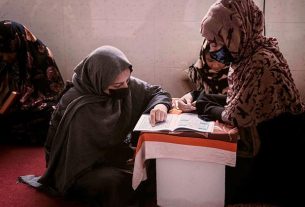(Tallahassee) – Florida’s recent educational laws and policies fuel discrimination and fear, said Florida Rising, the Rule of Law Impact Lab at Stanford Law School, and Human Rights Watch in a report released today. Although K-12 education is largely controlled by local and state governments in the United States, the federal government should be doing much more to address curriculum censorship that advances discrimination.
In the 86-page report, “‘Why Do They Hate Us So Much?’: Discriminatory Censorship Laws Harm Education in Florida,” the groups say that Florida leaders are reshaping elementary, middle, and high school classroom content through new laws and policies that censor, distort, and discriminate. Such laws restrict classroom instruction about race in US history, sexual orientation, and gender identity, ban books reducing the information available to students, and promulgate inaccurate and misleading civics and history standards.
“Black and LGBTQ Floridians are exhausted by leaders who weaponize their identities and histories to score political points,” said Dwight Bullard, senior political advisor at Florida Rising. “From the state house in Tallahassee to local school boards, our elected officials must recommit to delivering a high quality and inclusive education, something all Florida families hold sacred.”
Researchers from Human Rights Watch, Rule of Law Impact Lab, and Florida Rising interviewed 62 students, parents, teachers, and advocates throughout Florida between January and April 2024. Researchers also analyzed Florida’s education laws and policies, court and administrative records, and media accounts.
Those interviewed described the harm they had suffered from the new laws. The groups found that Florida’s discriminatory educational policies violate students’ rights to education, to information, to nondiscrimination, and violate Floridians’ rights to free speech and equal treatment under the law.
The groups found that Florida has fostered an environment in which educators and students fear retaliation. Several teachers described being reprimanded for violating the new laws and policies, and news reports indicate teachers have been investigated and fired. Students and community members said they experienced identity-based harassment from extremist political groups supporting the state’s policies.
“I feel like the experiences of Black people don’t have a place in public life, like schools,” a Black parent said. “It’s one thing when these attitudes exist in the public sphere, it’s another thing when they are sanctioned by the government.”
A high school senior said:
People feel empowered to attack queer students because if the legislators can do it, they think they can do it too. I’ve heard slurs being said constantly and no teacher bats an eye and it’s like, whoa, why aren’t you doing anything about it? We need more protections for queer students. We need schools that are an inclusive space.
Florida leads the national crisis of educational censorship and is home to the most banned books and the harshest curriculum restrictions but it is not alone. A growing number of states have recently passed laws restricting classroom discussions of race, gender, sexual orientation, or US history.
“June 19 is Juneteenth, a time we should reckon with the devastating costs of suppressing information, including about slavery and its legacies, that will move the United States forward,” said Trey Walk, US democracy researcher and advocate at Human Rights Watch. “We’re also celebrating Pride Month, a time we cherish the freedom of LGBTQ people to be represented and valued, including in their schools.”
In 2021, the Florida Department of Education issued guidance restricting classroom discussions of race and racism, beginning with a ban on “critical race theory.” The following year, the Florida legislature passed House Bill 7, Stop Wrongs against Our Kids and Employees Act (commonly abbreviated as the “Stop W.O.K.E” Act), which limits instruction about racism in workplaces and educational institutions. Floridians immediately challenged the law in courts, resulting in federal courts striking down the workplace provisions of the law and temporarily blocking the law from being enforced at colleges and universities.
Florida undermined opportunities for students to learn about Black history by forbidding public schools from offering the College Board’s Advanced Placement African American studies course, and in 2023 releasing African American history standards widely rejected by scholars as inaccurate and containing unacceptable omissions. The standards included language that was offensive to Black Floridians, such as suggesting that enslaved people gained valuable skills or that Black victims of racial violence carried out similar acts against white people.
During the same period, Florida leaders imposed a series of measures, including House Bill 1557 and House Bill 1069, to curb classroom instruction on sexual orientation or gender identity. Florida also forbade local school districts from administering the Centers for Disease Control and Prevention annual survey collecting important information about youth behavioral and mental health. This data helps educators and policymakers to craft meaningful health and educational programming for Florida youth.
With Florida leading the nation in the number of books banned from classrooms and school libraries, lawmakers recently passed a law that would limit the number of book challenges by people who are not the parents of students enrolled in Florida public schools. This modest reform came after Florida Governor Ron DeSantis admitted some groups have weaponized the book challenge process for political gain.
Stifling inclusion and discussion at the K-12 level, especially through discriminatory censorship of discussions of race, sexual orientation, or gender identity, risks creating an environment in which exclusion is acceptable. Discriminatory censorship during a student’s school years suppresses free expression and access to information and may ultimately thwart the informed political participation required for US democracy to thrive.
A bold federal response is needed to address this crisis in US public schools, the organizations said. The US Departments of Education and Justice should educate the public about civil rights mechanisms and respond to complaints in a transparent and timely manner. Congress should robustly fund these civil rights protection mechanisms, which currently receive insufficient funding. President Joe Biden should convene a national summit on ending discriminatory educational censorship across the US.
Florida leaders should rescind their discriminatory policies and promote a curriculum that prepares students to live healthy lives in a diverse society.
“Democracy starts in our public school classrooms,” said Amrit Singh, executive director at Stanford Law School’s Rule of Law Impact Lab. “We need robust civil rights protections to combat this trend of discriminatory censorship and book bans in schools. Children must have access to unbiased education so that they can thrive and take their rightful place as leaders of tomorrow.”


